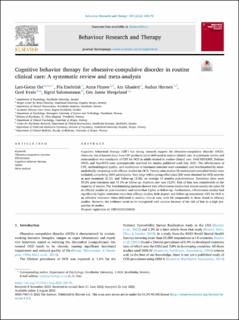| dc.contributor.author | Öst, Lars Gøran | |
| dc.contributor.author | Enebrink, Pia | |
| dc.contributor.author | Finnes, Anna | |
| dc.contributor.author | Ata, Ghaderi | |
| dc.contributor.author | Havnen, Audun | |
| dc.contributor.author | Kvale, Gerd | |
| dc.contributor.author | Salomonsson, Sigrid | |
| dc.contributor.author | Wergeland, Gro Janne Henningsen | |
| dc.date.accessioned | 2022-11-21T15:13:02Z | |
| dc.date.available | 2022-11-21T15:13:02Z | |
| dc.date.created | 2022-08-26T09:07:52Z | |
| dc.date.issued | 2022 | |
| dc.identifier.issn | 0005-7967 | |
| dc.identifier.uri | https://hdl.handle.net/11250/3033216 | |
| dc.description.abstract | Cognitive behavioral therapy (CBT) has strong research support for obsessive-compulsive disorder (OCD). However, less is known about how CBT performs when delivered in routine clinical care. A systematic review and meta-analysis was conducted of CBT for OCD in adults treated in routine clinical care. Ovid MEDLINE, Embase OVID, and PsycINFO were systematically searched for studies published until July 2021. The effectiveness of CBT, methodological quality, and moderators of treatment outcome were examined, and benchmarked by meta-analytically comparing with efficacy studies for OCD. Twenty-nine studies (8 randomized controlled trials) were included, comprising 1669 participants. Very large within-group effect sizes (ES) were obtained for OCD-severity at post-treatment (2.12), and follow-up (2.30), on average 15 months post-treatment. Remission rates were 59.2% post-treatment and 57.0% at follow-up. Attrition rate was 15.2%. Risk of bias was considerable in the majority of studies. The benchmarking analysis showed that effectiveness studies had almost exactly the same ES as efficacy studies at post-treatment and somewhat higher at follow-up. Furthermore, effectiveness studies had significantly higher remission rates than efficacy studies, both at post- and follow-up assessment. CBT for OCD is an effective treatment when delivered in routine clinical care, with ES comparable to those found in efficacy studies. However, the evidence needs to be interpreted with caution because of the risk of bias in a high proportion of studies. | en_US |
| dc.language.iso | eng | en_US |
| dc.publisher | Elsevier | en_US |
| dc.rights | Attribution-NonCommercial-NoDerivatives 4.0 Internasjonal | * |
| dc.rights.uri | http://creativecommons.org/licenses/by-nc-nd/4.0/deed.no | * |
| dc.title | Cognitive behavior therapy for obsessive-compulsive disorder in routine clinical care: A systematic review and meta-analysis | en_US |
| dc.type | Journal article | en_US |
| dc.type | Peer reviewed | en_US |
| dc.description.version | publishedVersion | en_US |
| dc.rights.holder | Copyright 2022 the authors | en_US |
| dc.source.articlenumber | 104170 | en_US |
| cristin.ispublished | true | |
| cristin.fulltext | original | |
| cristin.qualitycode | 2 | |
| dc.identifier.doi | 10.1016/j.brat.2022.104170 | |
| dc.identifier.cristin | 2046204 | |
| dc.source.journal | Behaviour Research and Therapy | en_US |
| dc.identifier.citation | Behaviour Research and Therapy. 2022, 159, 104170. | en_US |
| dc.source.volume | 159 | en_US |

